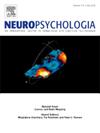Investigating social cognition in Multiple Sclerosis: Does Implicit Biological Motion processing affect visuo-spatial attention?
IF 2
3区 心理学
Q3 BEHAVIORAL SCIENCES
引用次数: 0
Abstract
The perception of Biological Motion (BM) is critical for understanding social cues. A limited number of moving light dots resembling a moving individual, can suggest social intention information, providing an attentional orienting. This ability to predict other's intentions from BM cues refers to social cognition, an ability impaired in several neurological diseases.
As in patients with Multiple Sclerosis (MS) an impairment in visuo-spatial attention and social cognition has been observed, we aim to investigate the possible differences in the visuo-spatial attention between MS patients and healthy individuals by using BM stimuli as cues.
We tested 37 MS patients and 40 healthy controls (HC), who performed a modified central cue Posner task, using BM stimuli as cues that are not always predictive of the target location. They were represented by Point Light Walker (PLW) configuration, a series of dots arranged at the human joints and walking through the left or right of the screen, shown in the global (whole body) or local (two dots, indicating the feet of the PLW) configuration.
MS patients exhibited overall slower responses compared to HC. In MS patients, a weaker advantage of valid trial over invalid ones was evident when cue had a local than global BM configuration. Also, MS patients showed a slower performance than HC in valid trials with local BM cues. The difference between groups was attenuated when the cue had a global BM configuration. These findings suggest possible impairment of local BM cue processing in MS patients, possibly due to delays or deficits in interpreting feet motion as biological information, reducing the cue's predictive power.
调查多发性硬化症患者的社会认知:内隐生物运动处理会影响视觉空间注意力吗?
生物运动感知是理解社会线索的关键。数量有限的移动光点类似于移动的个体,可以暗示社会意图信息,提供注意定向。这种从BM线索预测他人意图的能力涉及社会认知,这是一种在几种神经系统疾病中受损的能力。由于在多发性硬化症(MS)患者中观察到视觉空间注意和社会认知的损害,我们的目的是通过BM刺激作为线索来研究MS患者与健康个体在视觉空间注意方面可能存在的差异。我们测试了37名MS患者和40名健康对照(HC),他们执行了一项改良的中央提示波斯纳任务,使用BM刺激作为提示,但并不总是预测目标位置。它们由点光行走器(PLW)配置来表示,这是一组排列在人体关节处并在屏幕的左侧或右侧行走的点,以全局(全身)或局部(两个点,表示PLW的脚)配置来显示。与HC相比,MS患者总体反应较慢。在MS患者中,当cue具有局部而非全局BM配置时,有效试验的优势明显弱于无效试验。此外,在有局部脑脊髓炎提示的有效试验中,MS患者表现出比HC更慢的表现。当线索具有全局BM配置时,组间差异减弱。这些发现表明,多发性硬化症患者局部脑脊髓炎线索处理可能受损,可能是由于将足部运动解释为生物信息的延迟或缺陷,从而降低了线索的预测能力。
本文章由计算机程序翻译,如有差异,请以英文原文为准。
求助全文
约1分钟内获得全文
求助全文
来源期刊

Neuropsychologia
医学-行为科学
CiteScore
5.10
自引率
3.80%
发文量
228
审稿时长
4 months
期刊介绍:
Neuropsychologia is an international interdisciplinary journal devoted to experimental and theoretical contributions that advance understanding of human cognition and behavior from a neuroscience perspective. The journal will consider for publication studies that link brain function with cognitive processes, including attention and awareness, action and motor control, executive functions and cognitive control, memory, language, and emotion and social cognition.
 求助内容:
求助内容: 应助结果提醒方式:
应助结果提醒方式:


